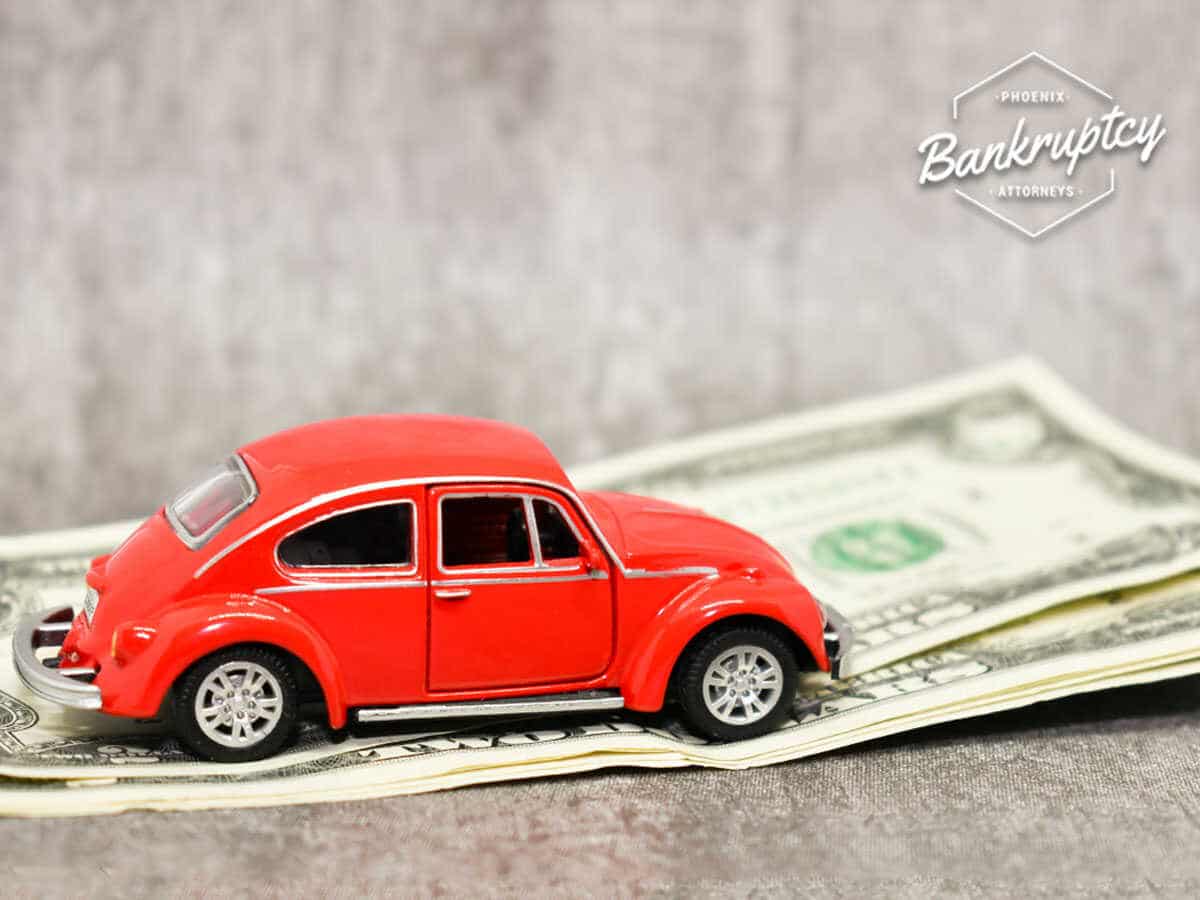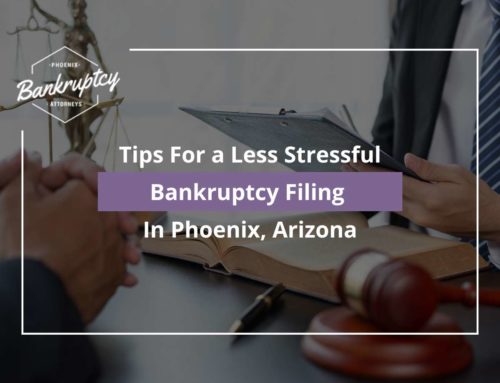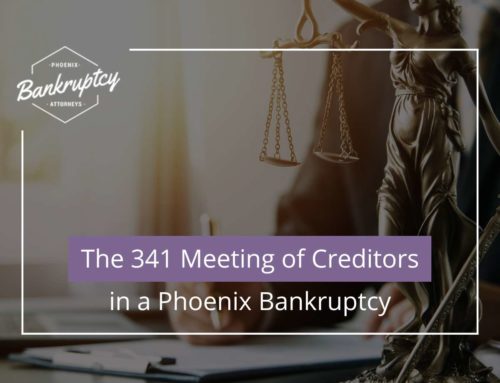Will Bankruptcy Affect My Auto Loan?
Many times a car loan can become unmanageable because of unforeseen circumstances such as: Divorce, unexpected medical bills, loss of a job, death of a loved one, or a myriad of other complicating circumstances. Often, when debt gets out of control, many people in Phoenix seek a “Fresh Start” and relief from vehicle debt.
If you are struggling with debt, you may be considering declaring bankruptcy in Phoenix. But if you’re considering bankruptcy, you may also be considering how this will affect your car loan. There are several factors that will impact how bankruptcy and your car loan interact, like the chapter you file, whether you are current on payments, and more. Whether your vehicle is financed, you should consult with an experienced Phoenix bankruptcy attorney before filing your bankruptcy petition.

Bankruptcy Will Protect You Against Creditors If You Are Behind On Car Payments
Bankruptcy can be a strong protection against your creditors if you are behind on car payments. Once your petition is filed under either Chapter 7 or Chapter 13, you will be protected by the automatic stay. The automatic stay prevents your creditors from proceeding with collection methods like foreclosure, wage garnishment, and vehicle repossession. However, this protection generally lasts the lifespan of your bankruptcy. In a Chapter 7 bankruptcy, this is usually 4-6 months. A Chapter 13 bankruptcy lasts either 3 or 5 years. If you don’t resolve the past-due balance in that time, your creditor can proceed with repossession after your case is discharged. When your balance in arrears is significant, it may not be possible to become current during a Chapter 7. You may need to use Chapter 13 to give yourself more time to catch up on payments.
If you make more than the state median income for your family size, your Chapter 13 payment plan will last 5 years. If you make less, it will be 3 years. One of the debts in your payment plan will be your past-due balance, as well as the rest of your loan. Your car loan must be paid in full during your Chapter 13 if you’d like to keep it. This may be very similar to the terms of your original loan, or could change the length of your loan’s term. If you use Chapter 13 to avoid a vehicle repossession, your car loan will be paid in full if your case is discharged successfully, and your creditors will have no standing to proceed with a repossession.
Debt Reaffirmation & Redemption
One issue that is common among our clients is that the balance of their auto loans are far higher than the vehicle’s current value. If you want to keep the vehicle in a Chapter 7 bankruptcy, you may be able to continue paying on your loan without issue. However, your lender may require that you redeem or reaffirm your loan if you wish to keep your vehicle. In a redemption, you will keep your vehicle but pay its market value, rather than the balance of your loan. You typically must be able to pay the market value in a lump sum payment if you want to redeem your vehicle through Chapter 7 bankruptcy. Consult with a Phoenix bankruptcy attorney if you intend to redeem your loan through Chapter 7. In a reaffirmation, you will agree to continue paying on the loan as before the bankruptcy. Trustees are reluctant to approve reaffirmations, and generally will only do so if the agreement is fair for the debtor. Pursuing either method of retaining your vehicle generally requires a hearing in addition to the mandatory 341 Meeting of Creditors.
Chapter 7 Bankruptcy Exemptions In Phoenix
One issue you will encounter in Chapter 7 bankruptcy is that assets will only be protected if they fall within your state’s allowable exemptions. Some states will allow you to use federal exemptions, but many will not, so confirm with a bankruptcy attorney in Phoenix before proceeding. Any assets that are unprotected may be seized by your bankruptcy trustee and sold to pay your creditors. If the asset isn’t paid in full, the amount of equity you have in the asset will be used for exemption purposes. Let’s say the value of your car is $25,000, and you have a remaining balance of $5,000 on your auto loan. This would mean you have $20,000 equity in the vehicle. In many states, this is far more than exemptions allow for unless certain circumstances are present. Consult with a bankruptcy attorney licensed in your state if you are concerned about exemptions protecting your vehicle in a Chapter 7 bankruptcy.
Surrendering Your Vehicle In Bankruptcy
For many people who file bankruptcy, it is easier to simply give back a financed vehicle rather than use methods like redemption and reaffirmation. There are several reasons this could be. The filer’s lifestyle and vehicle needs could have changed. The vehicle could be in poor condition, and the filer would rather not deal with several trips to the mechanic after bankruptcy discharge. The balance of the loan could be higher than its value, and the filer wanted a new vehicle anyway. No matter the reason, surrendering a financed vehicle is an option when you file bankruptcy.
One of the main concerns you may have about surrendering your vehicle in bankruptcy is having an alternative method of reliable transportation. For many, public transportation is infeasible or ridiculously inconvenient. Having a vehicle is the only option. While you will need to wait until your case is discharged to open new lines of credit. However, you may be able to finance a new vehicle while your bankruptcy is still pending. You must obtain approval from your trustee before making such purchases in a Chapter 13, to make sure you will still be able to pay your mandatory debts in your payment plan. You won’t need approval from the trustee to get a new vehicle if you file Chapter 7. Many of our clients can finance a vehicle just a day or two after filing their bankruptcy petitions. You should consult with a Phoenix bankruptcy attorney before making your decision, as well as before surrendering your vehicle.
Car Loans For Credit Rebuilding
Many of our clients prioritize rebuilding their credit as part of bankruptcy. Making timely payments on lines of credit is a good way to improve your credit score post-bankruptcy. However, if you retain your same financed vehicle through your bankruptcy, your lender will no longer be required to positive report on your loan. Your lender can still negative report when you make late payments. Only a new lender- i.e., if you finance a new car- will have to credit report your positive payments after a bankruptcy.
Contact Phoenix Bankruptcy Lawyers For Advice On Filing Bankruptcy & Financing a Vehicle
Do you have more questions about how filing bankruptcy could impact your car loan? Our experienced Phoenix bankruptcy attorneys are here to help. We offer free phone consultations, as well as affordable post-filing payment plans meant to work with your budget. Call or use our online form to get started today. We offer free consultations. Call (480) 263-1699.
PHOENIX BANKRUPTCY ATTORNEYS





